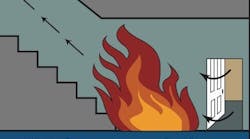I wrote this article because we do have many similarities to extended hours workers, whether we are working the 12- or 24-hour shift. This is of course in addition to all of the other risks we are privy to due to the very nature of our job. Please just take a couple of minutes to look it over and I hope each and every one of you can get a little something from it.
We all work so hard to make it to that day of retirement, unfortunately some of us come up short for reasons beyond our control, but it is our goal. I was having dinner with a retired firefighter friend who said it best when I asked "How does it feel to be retired now?" His response was simply "Well Joe I feel like I won." With that said, be safe out there...
According to a study conducted and published in October of 2003, employees regularly working evening and night shifts in 24/7 operations suffer higher rates of gastrointestinal ailments, cardiovascular disease and sleep disorders than the general population. These workers also tend to consume more cigarettes, caffeine and other stimulants than their daytime counterparts, with more than double the rate of smoking. These workers account for about 18 percent of the total workforce.
Greater Health Problems & Poor Health Behaviors
The study cites a number of severe health problems and unhealthy lifestyle behaviors that occur with greater frequency among extended hours workers:
Gastrointestinal disorders - Peptic ulcers are two to five times more frequent among extended hours workers than among day workers as determined by using a standardized measure that rates digestive disorders, such as heartburn, nausea and abdominal pains.
Cardiovascular disease - Epidemiological studies show an association between shift work and cardiovascular disease, including higher morbidity with increasing age and shift work experience, a higher prevalence of angina and hypertension, and increased risk for myocardial infarction in occupations with a high proportion of shift workers.
Suspected contributing factors include - Desynchronization of circadian rhythms tied to the cardiovascular system, such as blood pressure, lipids, cholesterol and insulin; changes in lifestyle affecting diet, smoking, alcohol and exercise; and increased stress over conflicts between work and family duties and activities.
Smoking - Fifty-five percent of male extended hours workers smoke, compared with a national average of 25 percent of men aged 18 or older; 51 percent of female extended hours workers smoke compared with 21 percent of women over age 18.
Reliance on stimulants - Workers in extended hours operations are twice as likely to use prescription or non-prescription stimulants as the general population. Twelve percent of workers in extended hours operations reported using stimulants at least several times per month and 2 percent reported using them daily. This compares with a 2002 National Sleep Foundation (NSF) poll that found that 6 percent of respondents used stimulants. The highest use of stimulants in extended hours populations is among workers aged 25 through 34, who report the greatest alertness challenges while working.
More caffeine consumption - Consumption of caffeinated beverages was also higher. Among all employees surveyed, average consumption of caffeinated beverages was two cups or cans per day. But extended hours workers drink on average more than three cups or cans per day. Among caffeine drinkers, 34.3 percent of night shift workers drank four or more cups or cans compared with 28 percent on the daytime shift.
The more serious health problems were exacerbated by poor nutrition, higher smoking and caffeine consumption rates, less exercise and a somewhat higher tendency to be overweight (67.1 percent of extended hours workers were overweight or obese compared with 64.5percent of the general population). Damn here is that obesity issue yet again!
Factors contributing to poor nutrition include lack of easy access on the job to healthful foods, with extended hours workers often left with no alternative but to obtain food from vending machines during working hours. Twenty-eight percent of extended hours workers reported having good nutritional practices, compared with one-third of the average population. With respect to exercise, 77 percent of extended hours workers reported getting no regular exercise. This compares with a 2002 Gallup Poll showing that approximately 41 percent of all Americans report exercising regularly.
Not surprisingly, extended hours workers also suffered sleep-related problems including chronic sleep deprivation, insomnia and sleep apnea (11 percent versus two to four percent of the general population). One particular danger is fatigue-related car accidents. According to a 1999 NSF poll cited in the report, 41 percent of extended hours employees reported nodding off while driving compared with 28 percent of day workers.
The article also went into the divorce rates and family stressors that night shift workers deal with, but that's a whole story in and of itself. We all know most of this but fail to take the necessary steps for corrective action. Other factors may inhibit us from taking those steps. The end result is that in most cases we fail to practice behavior modification. Talk about hard habits to break.
I wanted to thank all of you for your input on my last article and please continue to call with any questions regarding yourself, friends or family members. I must admit I was surprised at the amount of calls and questions I received as a result of the article. I hope that I was able to shed some light on your questions and concerns. If there is anything in specific you would like covered in future articles regarding sleep or you have questions and concerns I would be more than happy to them discuss with you. My office number is: (954) 442-8694 and my cellular phone number is: (954) 444-8861. just give me a call.





